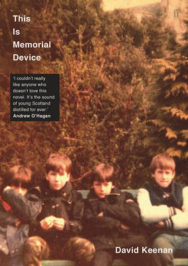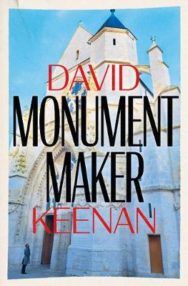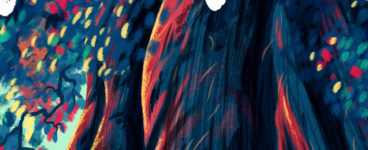‘Is it possible for books to read? For books to dream within books?’
David Keenan’s fifth novel attempts to answer this, through genres, and eras, and references to past work sure to please the avid Keenan reader. Monument Maker is a book within a book that spans hallucinatory historical epics through future-visioned histories of the world narrated by a British soldier made prophetic by depths of suffering. An epic written over 10 years, it’s a meditation on art and religion, and what it means to make a monument. Read two excerpts below.
Extract taken from Monument Maker
By David Keenan
Published by White Rabbit Books
The French know how to relax, and they do their relaxing anywhere. That’s the conclusion you would be drawn to if you had joined my Flower and I as we cycled along the Canal du Loing and passed sleeping motorcyclists passed out in the weeds by the bank, families picnicking on the verge by the side of the road, two fellows fishing round the back of an abandoned grain silo and best of all a young girl on a fold-out bed at the foot of a row of terrible rusting gas tanks, cut off from the sun and hidden in shadow, fully spreadeagled as though on a beach in the Med.
Another conclusion to which you may have been drawn had you accompanied us on this idyllic day out now misfiled somewhere long ago in the past would be that French householders are inexplicably shocked to see anyone who does not resemble themselves pass anywhere near their homes. The French have a facial expression reserved especially for the split second you pass by their domain that best resembles a puzzled bird, as you pass by and you gaze into their gardens with all of the longing you could possibly muster for another life which you could disappear into, another life where tall sunflowers grow and tomato plants stand staked in neat rows and fat French cats prowl the undergrowth and forest vipers belt it as soon as they hear the rattle of your wheels, or before some fat French kid can drop a slab on their head, and still the French gaze at you in puzzlement as you speed by, as if you were there to steal their eggs, as an emissary from another planet where eggs are as gold, or to snatch a forbidden glimpse of a gaudy painted statue of the Virgin Mary in the back garden of a tree-shaded villa, or a photograph of said Virgin, even, stood in inexplicable sorrow next to a gaudy statue of a horse and cart, as if each view, each blissful domestic vista, were something to be snatched and stolen and secreted away in full view of its proud and hard-working owner, and every few minutes I would have to dismount and check behind me where, in the distance, my Flower, in a stained metallic-blue dress and sandals, her hair tied up and dishevelled in the sun, was invariably photographing one of these secret back gardens, invariably peopled by scattered passed-out French families in nothing but shorts and bikinis, sleeping with one eye open for would-be amateur sleuths ready to steal their native souls, and I confess that it irritated me, yes, this empty irritation would seize me and I would curse her under my breath, every time my Flower stopped to add yet another pointless photograph to her collection I would curse her – Lord! what an imbecile, I would say – because back then I was convinced that photography was a hobby for the sort of people who have hobbies (I curse that word hobby, just so you know, I curse that word God damn it I curse it and I spit it out, too), especially profligate photographers, of whom this day my Flower was surely one, as I flattered myself that I, and only I, was able to take the correct temperature of the moment, and when I stooped to photographing something or other myself, it was invariably the correct moment, and the perfect shot, and I took one photograph and one photograph only, because I flattered myself that I understood the moment of things, can you believe it, it would be laugh-outloud funny if it wasn’t outrageous, if it wasn’t extremely sad, that here I was, on a day trip out into the newly made past with my Flower by my side and I flattered myself that I understood the gravity of moments while at the very same time I fled them and cursed them and ranted against them as though the correct moment were only up ahead, in Nemours, in Fontainebleau, in the magical village of Larchant, where a visit to the basilica is reputed to cure you of madness, and of course I was right, and all of those villages do lie in the future of this book, just up ahead, stood in awe, themselves, at the perfect moment they have been entrusted to deliver, but even so, even when we reach these moments, which right now lie just ahead in this book – have patience where I had none – though even when we reach them we will find that our attention is once again drawn to the future, to the moment when all of the contents of these moments cohere in a single revelation, which, too, has its moment, and which points to a further revelation, which is the curse of photography too, I say, and which speaks to our terrible inability to simply be, to be still, and yet, should we refrain from internally ranting about the perceived failings of the ones we are supposedly head over heels in love with, we would again come to this empty point, this stillness, and we too, if we knew what was good for us, if we were able to arrive in this stillness, then we too would strip off most of our clothes and lie down, together, in the nearest tall grass and forgive ourselves everything but this present moment which we would indeed snatch and secrete and memorialise, in our fear and confusion and in our longing to let it all go to hell, even at the foot of rusting water towers, of ghastly oil drums and faceless industrial factories, even in the shadows of these ghastly things, we would topple from our bikes, on top of each other, in that summer, long ago, and we would refuse to move, yes, you heard that right Our Father who art in heaven, I am proposing a sit-in in my past, I am calling for a peaceful protest, back then, but what good does it do as my Flower pulls up at some idiot savant assemblage of mannequin heads and old rusting watering cans and wooden barrels and metal hubcaps behind a locked gate on the canal, and I look at my watch, and I throw my bike to the ground, and I stand, impatient, in the distance, I think you can picture me there, tapping my foot impatiently, like a bull, as if there was a more perfect assignation up ahead, and of course there was, there is, don’t despair, we’ll get there, in the end, but still, really, everything I have to say is here, everything I could have said was then, and I was unworthy of the gift. I had yet to learn gratitude. Ha ha, gratitude, I hear you say, bugger off with your gratitude. But you are only twenty years old – if that – and so I refuse to take you seriously. And I say it again: gratitude, you ungrateful little bastard, now grow the fuck up.
—
Have you heard of the doctrine of the Merits of Saints? The idea is that during their lifetimes the saints accumulated more spiritual merit than they could actually use themselves, thus generating a surplus (sounds like Marx? ha ha ha). This surplus is stored in a heavenly bunker known as the Thesaurus Meritorum Sanctorum. The Pope has access to this bunker and can draw from it in order to pay penances and commute guilt, and he can draw from it as much as he wants because Christ’s merits, which as we have established are infinite, are included in its store. Of course, the papacy took it a step further and claimed that the Pope could commute sins of souls awaiting judgement in Purgatory, as well as those in the flesh, but bear with me. And though I despise the psychologising of the sacred (call me Bernard), really, the neuroticising of God (call me a Gothic cathedral), but if the saints truly have the power to forgive and commute, and I have seen it happen, my friend, and if Christ is infinite, too, and he must be, then there is more love and forgiveness in this world than we can ever make use of, and all we have to do is ask, but man is troubled by guilt, and cannot raise himself by his own bootstraps, cannot lift this burden of guilt because of the sure knowledge, accepted or refused, but the sure knowledge all the same that existence generates suffering (a noble truth, indeed), that life feeds on life, and that inside we are a mess of nasty and rejection and hatred and hubris and confusion, inside we are seething, and feel awful, and in need of something else, something outside of us, someone outside of us who resembles us, who is us, but who has the unequivocally established ability to redeem the flesh, a hero who must enter history, as a word, for our comprehension, and whose ministry must be taken up, in time, which is the power of Logos, which unfolds, as a story, and this is where the evangelists and the missionaries come in, because if there is enough belief in the Thesaurus Meritorum Sanctorum, in the secret bunker, in the powers of the saints, in the forgiveness of Jesus, and in the concomitant promise of eternal life, then it is, it simply is, and man is capable of entering into it, but only if we truly believe there is a son of God, and that the ultimate nature of God is love, which is expressed throughout His creation, and whose entrance into history is the most significant event in time, hence our calendars begin at the approximate date of the birth of Christ for a great and beautiful reason, because marking history with his birth means every day is lived in the knowledge of forgiveness and the absolving of sins, for who amongst us has not been less than life, and knowledge of God through the example of Christ and of sainthood becomes the most significant fact, the greatest example, the ultimate manifestation of a revelation that is capable of marshalling all of our belief, our combined psychic powers, and our longings, too, and our love, even, all of our foiled love, and transmuting it, through belief and surrender, into so much candyfloss, but rivals spring up, temporal power inevitably channel the same urges, the same needs, that less than life should require more than life, in the balance, and so make it so, is obvious, and so all of the Caesars and all of the Hitlers to come, who must be reckoned with, but who God, through the ministry of His son, and the example of the saints, will also forgive, thanks to the surplus of merit and the overflowing of good, which is infinite, and so will always triumph, in this world, where everything is forgiven, if we make it so. And if you think you understand that, then you have understood nothing, and you are the perfect fool (on a donkey).
Monument Maker by David Keenan is published by White Rabbit Books, price £25
ALSO IN THIS ISSUE

 Small Bodies of Water
Small Bodies of Water
‘I grew up with access to swimming lessons and public swimming pools – privileges that are easy to t …















